RV Camping tips for beginners
This summer we did something for the first time. We rented an RV and explored the northern part of Vancouver Island in British Columbia. We’ve used an RV once before, but that was before kids. This blog post shares RV camping tips and lessons learned from our first family RV road trip.
Originally, we planned to rent an RV and explore the Southwest USA. But then Covid hit. USA-Canada borders closed. You know how the story goes.
So, we shifted our focus to Western Canada. The new plan was to drive the RV to the Canadian Rockies and visit Banff, Jasper and Yoho National Park. We love the Canadian Rockies so it’s an easy compromise.
However, shortly before making our RV rental reservation, Covid numbers began to spike again. Provincial borders between British Columbia and Alberta were once again in question. Then the summer wildfires ripped through British Columbia and travel to central BC was restricted.
2021 was starting to feel a lot like 2020.
Our summer road trip plans changed once again. This time, we decided to visit northern Vancouver Island.
RV Camping Vancouver Island
Once it was decided that our summer RV camping trip would be to northern Vancouver Island, the next step was to find an RV that fit our family needs. We researched several options on Outdoorsy, RV Share and RVezy using our desired dates and location.
These RV rental sites are mostly the same, so it doesn’t matter who you use. What’s more important is finding the RV that fits your family needs.
After hours of research, we decided to go with RVezy because it has a lot of RV options available on Vancouver Island.
As you can see in the photos, we selected the smaller Class C Motorhome. This model is 24 feet long. We considered an RV trailer but had concerns about towing it with our small SUV. We have a hitch but we are not comfortable pulling a heavy trailer.
Search for deals on RV rentals here. Or, check out these RVs for sale.
Here is a quick video tour of our RV Camper
Having trouble viewing the video? Watch directly on Facebook here.
Find the perfect RV for your family needs on RVShare.com
What we like about RV camping
Before we share our RV travel tips for beginners, we’d like to share what we like about RV camping. There are plenty of reasons to choose RV camping vs tent camping or staying at hotels.
- Convenience – an RV provides everything you need. It’s nice to have a bathroom on board in case of emergency (which happens frequently when traveling with children).
- Simplicity – once the RV is parked at its camping spot, it only takes 5 minutes to hook up the electricity and water. No need to set up tents in the dark or inflate air mattresses.
- Protection – from rain, wind, animals and insects. We are not big fans of tent camping because bad weather and bugs can ruin the experience. An RV motor-home protects you from the elements.
- Storage – extra storage makes the camping experience much more enjoyable. Packing a car with camping equipment, personal items, food, drinks and outdoor equipment is annoying. There’s never enough room! And, you often have to make tough decisions on what items make the cut. With an RV you can take everything!
- Fridge – camping with a fridge is a game changer. You can do a proper grocery shop and not worry about the milk spoiling. No ice required.
- Cooking equipment – most RVs are fully stocked with a propane cook-top, microwave, toaster, utensils, cutlery, coffee maker, etc. All you need to bring is the food and drinks.
- Comfort – more room to relax. Travel days are more enjoyable, too. Our boys like that they can stretch and are not stuck in their car seats.
- They’re Fun! An RV’s is a cozy home on wheels. Our boys love sleeping in the section above the cab. It’s a unique sleeping experience.
What we dislike about RV camping?
Like most things in life, you have to take the good with the bad. It’s not all roses and rainbows when camping with an RV. Here are a few things we did not like.
- Stuck at the campground – with the Class C RV model, once you set up camp, you can’t drive to sights unless you pack up again. This is not ideal, especially if you plan to visit nearby attractions.
However, if you get a trailer, that’s a different story. You can then use your vehicle to explore. But then you need the right vehicle to pull the trailer and they are not as convenient as the Class C RV. - Parking – picking up groceries, getting fuel and visiting attractions is not easy with a big clunky RV.
- Driving – driving an RV takes practice. They have wide blind spots and it’s difficult to reverse. It’s a little unsettling when driving up hill and/or downhill because of the weight transfer. You need to drive slow and pack your patience.
- Cost – RV camping is expensive. You need to consider the cost of renting the RV, insurance and roadside protection. RV campgrounds with hookups cost between $50-$100 per night (depending on where you stay). When you start doing the math, it costs $300-$400 per night.
- Fuel – RVs are heavy and they burn fuel quickly. We spent about $175 to fill up the Class C motorhome. This got us about 400-500 km per tank.
- Campgrounds are crowded – most RV camping spots are packed close together. Some spots only give you 10 feet of outdoor space between your RV and your neighbour. RV campgrounds can be noisy and less private than you’d like.
Vancouver Island RV Road Trip
After we booked the RV camper with RVezy, we mapped out the road trip route and began making campground reservations.
Booking a campground in British Columbia during the summer is challenging at the best of times, so it’s essential to make reservations. Campgrounds are in high demand now that many people are choosing to travel closer to home.
To research Vancouver Island campgrounds, visit BC Parks Discover Camping. Also, this website is helpful to find RV campgrounds in British Columbia.
It did not make sense to rent the RV in Vancouver and pay the expensive ferry costs to cross from the Lower Mainland to Vancouver Island. We made the decision to pick-up the RV rental in Comox, which is about an hour north of Nanaimo. Given that RV’s are gas guzzlers, it’s more cost effective to pick-up the RV closer to your first destination.
Here’s the itinerary for our RV road trip on Vancouver Island:
- Nanaimo – 2 nights
- Comox – Pick up the RV from its owner
- Alder Bay RV Campground in Port McNeill – 2 nights
- Telegraph Cove
- Port Hardy RV Resort – 2 nights
- Moutcha Bay RV Campground, Nootka Sound – 3 nights
- Courtney – 1 night at this hotel
- Nanaimo – Ferry back to Vancouver
The first destination on our Vancouver Island RV road trip is Alder Bay RV Park, an oceanfront campground located between Port McNeill and Telegraph Cove. Most campgrounds require two nights minimum when making a reservation, so we stayed for two nights.
We visited Telegraph Cove before departing to our next destination, Port Hardy. In hindsight, it would have been better to spend more time in Telegraph Cove. It’s a cute old fishing village and launch point for whale watching tours, fishing excursions and sea-kayaking adventures.
We spent two nights at the Port Hardy RV Resort, located 3 km south of Port Hardy on the Quatse River. Our campground spot backed onto the river, which was a nice surprise. Our boys spent many hours fishing here. At the time of our visit in late August, there were literally hundreds of salmon swimming in the river. Sadly, the fish were not interested in our tackle and bait.
After Port Hardy, we returned south and made our way back towards Campbell River. We then drove west to our final destination, Moutcha Bay Resort. This location was the highlight from our RV camping trip. The RV campground is located on Nootka Sound, home to world class fishing.
We will write a separate blog post about this experience soon.
RV Camping Tips for Beginners
We learned a lot during our first RV camping trip. Here are a few things to consider:
- Plan your pick up and drop off – if you book with RVezy or any of the other RV booking websites, you will typically need to pick up the RV from the owner’s home. Don’t assume they will be available when you plan to arrive or drop off the RV. Make arrangements ahead of time and be flexible.
- Questions to ask the RV owner – where do you park your car? If pick-up is located a residential neighbourhood, is street parking available? Can you park your vehicle in the RV owner’s driveway?
- Confirm outdoor items that come with the RV rental – you will want folding outdoor chairs, propane BBQ (a small, portable grill is fine), propane tank, fire ring (if traveling during a fire ban), etc.
- Bring your own towels and linen – many RV owners will offer linen, pillows and towels for an additional charge. We prefer to bring our own. They may take up room in the car, but it gives us peace of mind that we’re sleeping on clean, comfortable sheets.
Campground travel tips
- Make campground reservations BEFORE you start your road trip – don’t assume the campground you desire will have availability if you show up without reservations. Especially during peak camping season. Many private RV campgrounds require a 2-night minimum.
- Does the campground have proper hookups? Don’t make assumptions. Ask questions. Does the camping spot have electricity, water and septic? How big are the spots?
- Confirm the voltage for the RV camping spot – does the spot you reserved have the correct voltage for your vehicle? We made this mistake at the first campground we visited. We should have chosen a different spot because the voltage output was too low for our RV.
- Remove grey and black water before you leave the campground – lighten your load before you start the next leg of your RV road trip. Whenever you have the chance to empty your water tanks, do it. For RV newbies, the grey water (or graywater) is gently used water from the shower or sink. Black water is waste from your toilet. Also, use campground toilets for number twos, if you can.
Driving the RV motorhome
- Stay away from cities – driving an RV in the city is nerve-racking. Parking is not easy and city traffic is daunting. When creating your road trip itinerary, avoid cities as much as possible. Stick to the rural communities and country towns instead.
- Do not leave loose items when driving – close doors and drawers, pack up loose items and store anything that might fall. It’s distracting to the driver if things are rattling and moving around.
- Drive slow – take it easy. You’re on vacation! Drive times will be longer than normal. Plan for it.
- Do you listen to music or radio when driving? If yes, make sure you inquire about the RV radio / music system. Don’t rely on your phone because the vehicle may not have bluetooth, which means you cannot access your music files. And, if you’re in a remote area, the radio may not work (this happened to us frequently on travel days).
Older RV models may have a CD player, so it’s not a bad idea to bring a few of your favourite CDs, just in case (as I write these words, I feel old). - Download shows for tablets – don’t assume you will have WIFI. Even if the campground says it provides WIFI. It’s very hit and miss, and most campground wifi is not very strong. If you’re traveling with kids, it’s best to download a few shows or movies BEFORE you hit the road.
- Fuel up often – don’t let your fuel tank go below quarter tank (half tank is even better). Plan your driving route and do the math on distances between towns. If you will be in a remote area for 100’s of kilometres, make sure you have enough fuel.
What to pack for an RV camping trip?
There are so many things to consider when packing for an RV camping trip. Here’s a few thoughts.
- Sheets for beds, sleeping bags, pillows and pillow cases, light blankets (get this blanket)
- Towels that can be used for the shower and beach (we use these travel towels)
- Light waterproof jacket (we all use Columbia jackets)
- Outdoor equipment like fishing rods, kites, soccer ball, inflatable raft, Frisbee, etc
- Outdoor folding chairs (if not provided)
- Fire ring and propane tank (if not provided)
- Sunblock, bug spray, afterbite (we always bring this when camping)
- Multi-charging station for your devices (RV’s have limited power outlets)
- Rope – always comes in handy
- Pocket knife, fire lighter and flashlight(s)
- Cooking essentials – salt, pepper, condiments, oil, butter, sugar, etc
- Drinking water – bring more than you think you’ll need
- Bluetooth speakers – for the beach, campfire, inside the RV, etc. This is the model we have.
Related post – 10 Common Family Travel Mistakes (and how to avoid them)
Final thoughts from our first RV camping experience
We enjoyed our first RV rental. Our boys had fun sleeping in the cozy motorhome and they love eating marshmallows by the campfire. It was nice to spend this quality time together, as a family. We slept in late, we went fishing every day, we flew kites, we swam in the ocean and we walked in the forest. It checked a lot of boxes.
This was a good introduction to RV camping. We spent a total of 7 nights inside the RV, which was just enough for us. By the end, we were looking forward to our comfortable beds and a hot shower with strong water pressure.
That said, we’re not sure if we are RV people just yet. It’s a fun way to travel, but we might be more cabin people. Time will tell.
Below are photos from our RV trip on Vancouver Island
Marshmallows and camping go together like peanut butter and jelly.
Searching for creatures and treasures on the beach at low tide.
Easy lunch at the campground – hot dogs and noodles.
I’m going to need to see your driver’s license young man…
Breakfast inside the RV. It’s actually quite spacious for a family of four.
Evening campfire session at Moutcha Bay Resort. This campground offers a lot of privacy.
Rope always comes in handy when camping.
We brought sleeping bags and sheets for our boys.
For our bed, we brought a duvet, sheets and extra pillows with pillow cases.
Bathroom and shower inside the Class C RV model. Tight, but effective.
The kitchen has a 2-burner cook-top, sink, microwave, fridge and lots of storage.
Are you planning an RV road trip?
Did you find these RV camping tips helpful?
Leave us a comment if you have specific questions. We’re still rookies, but we’ve learned a few things that may be helpful with your trip planning.
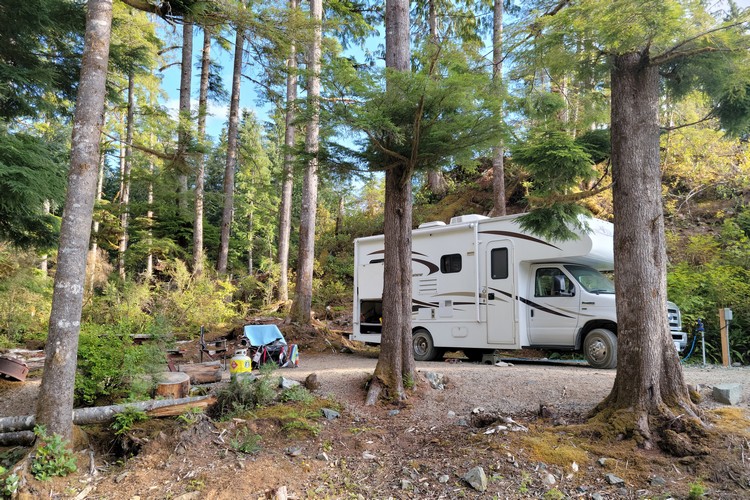
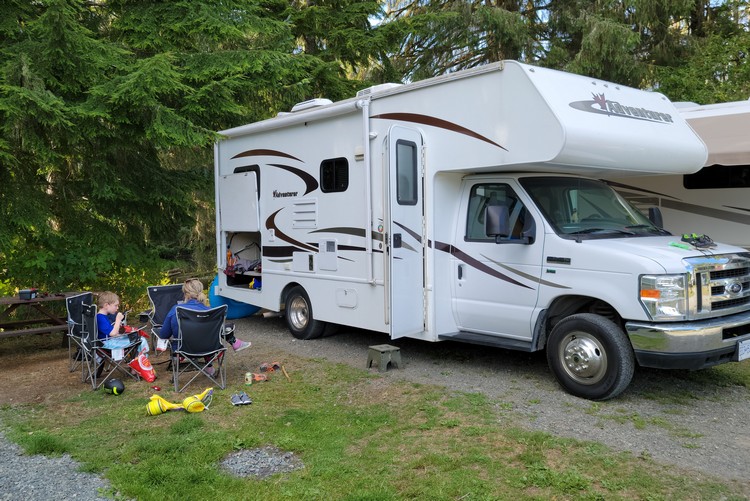

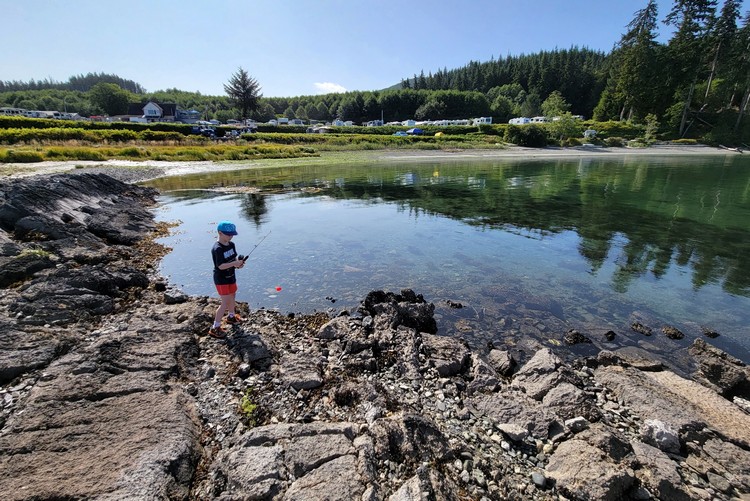
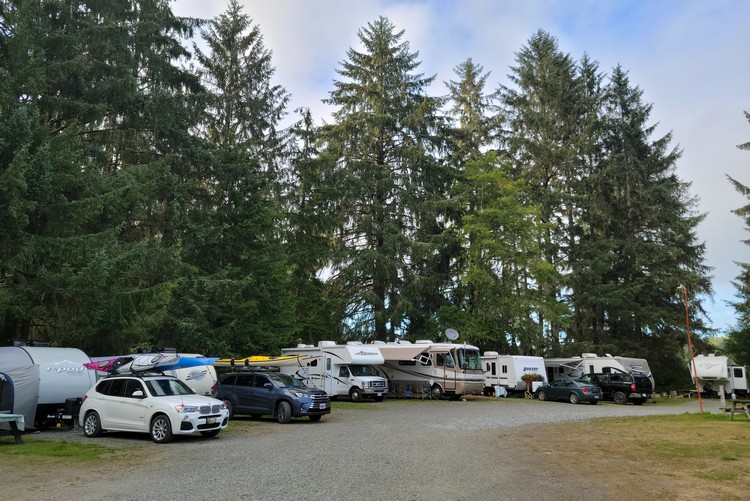
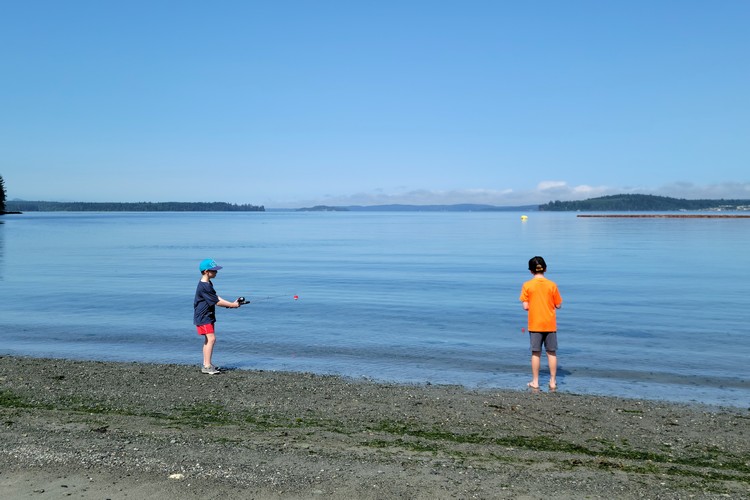

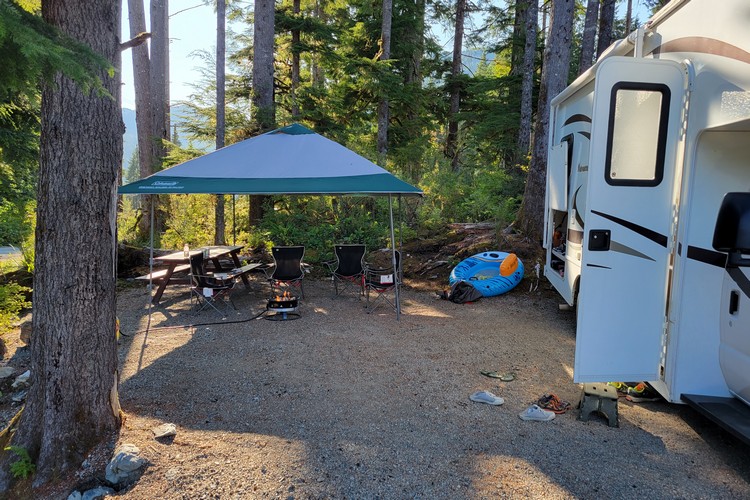
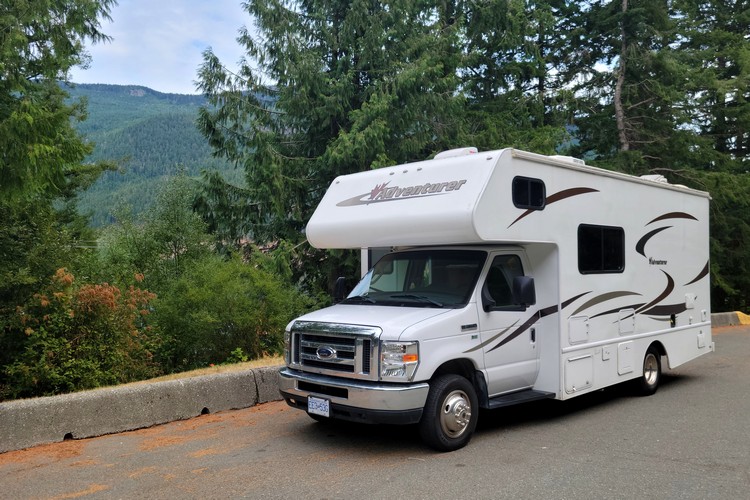
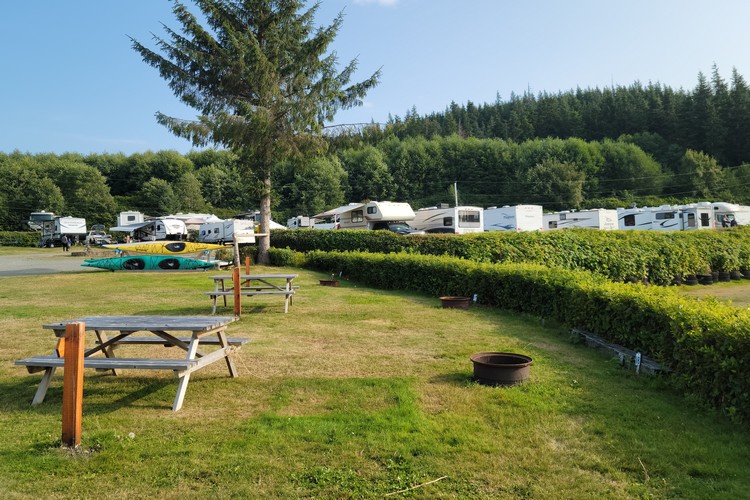
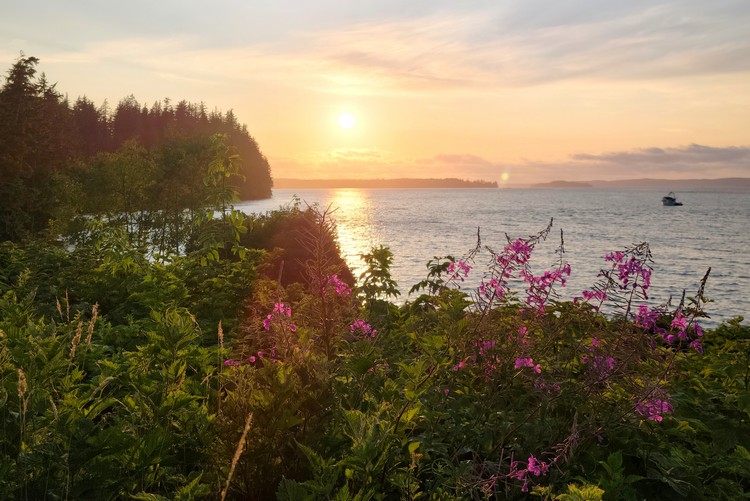
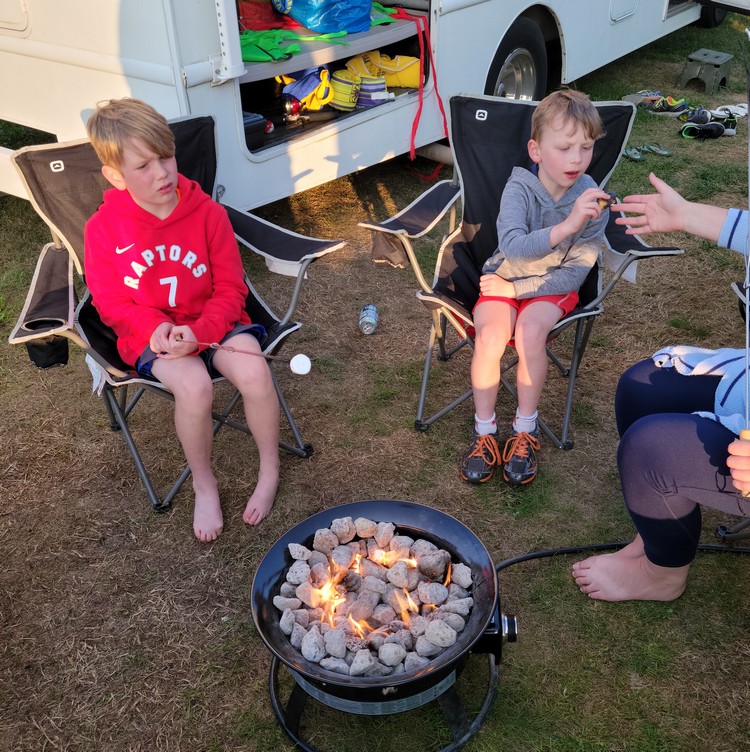
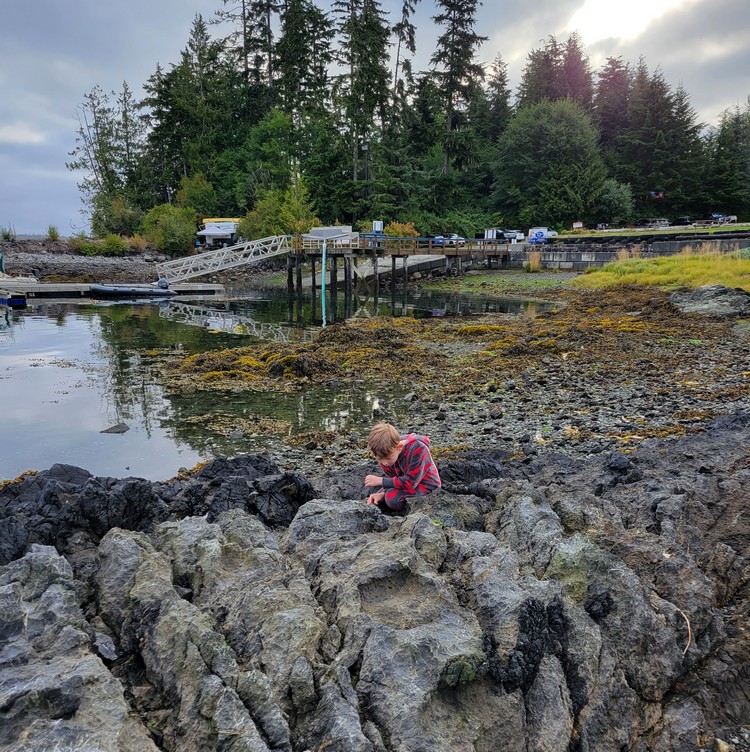
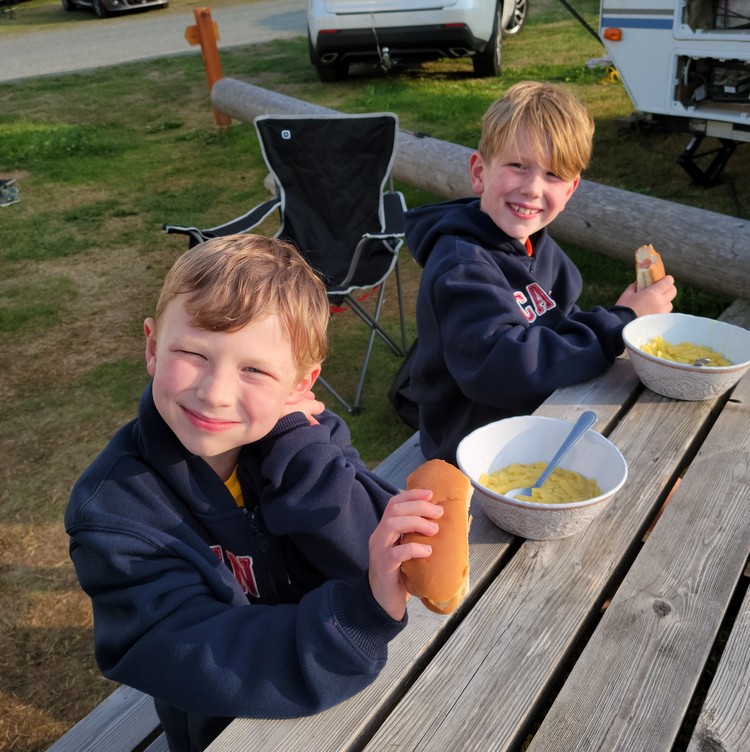
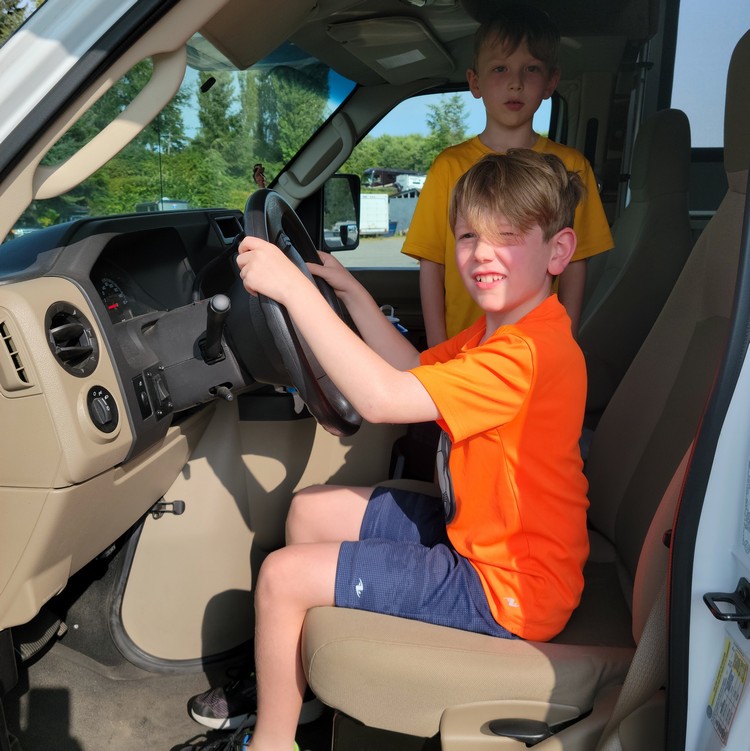
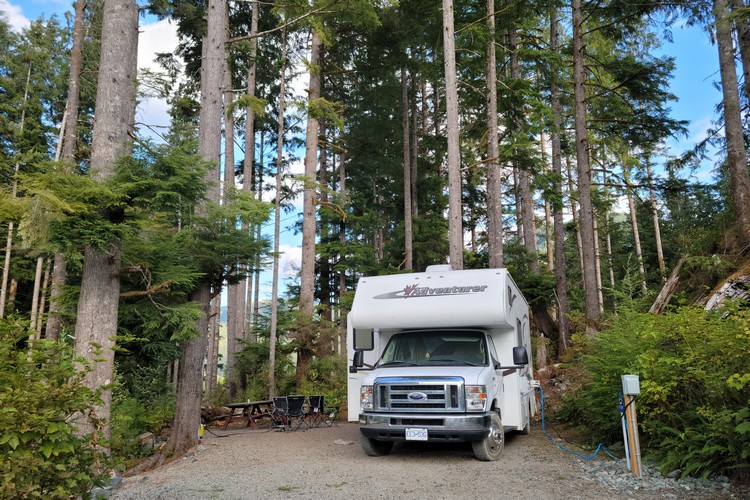
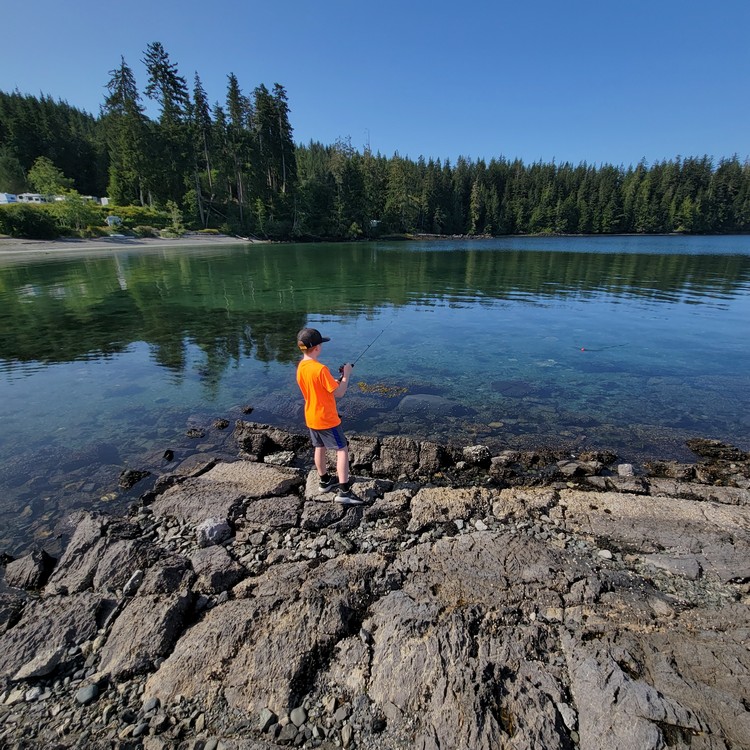
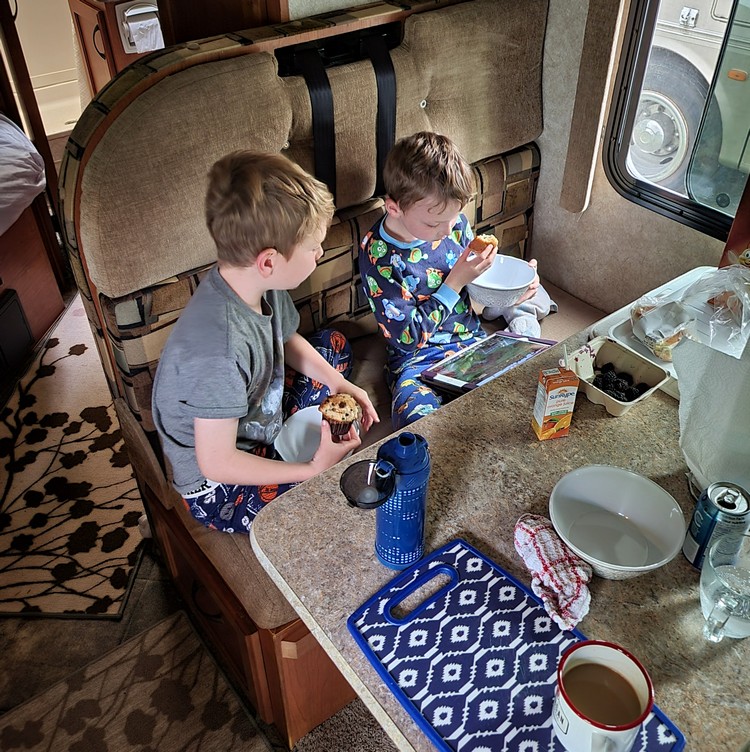
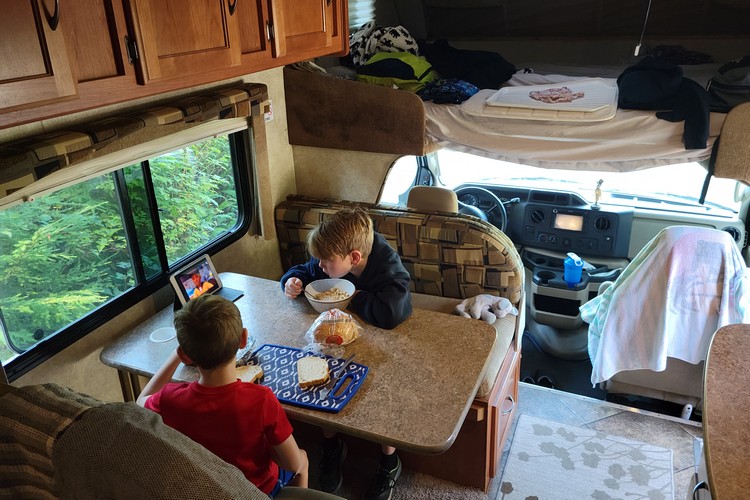
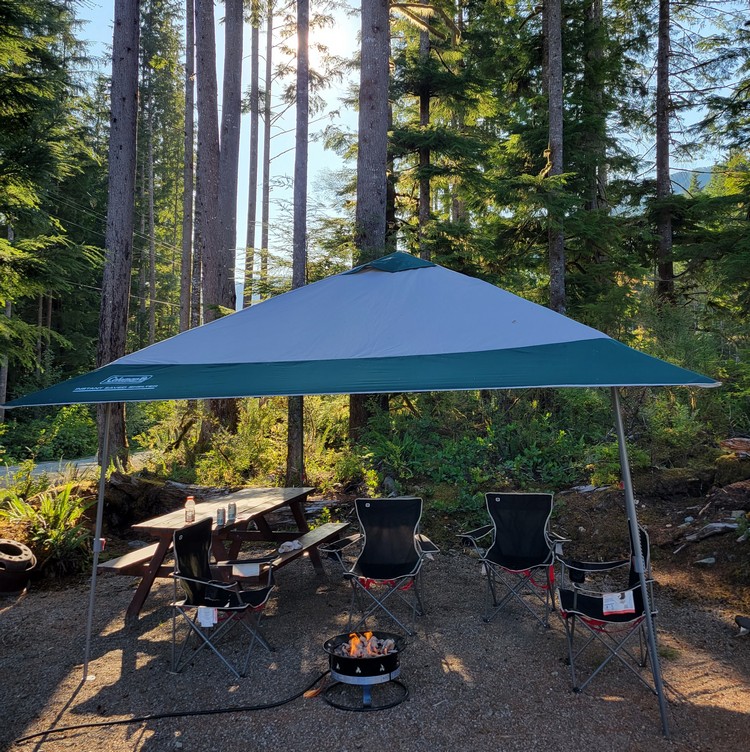

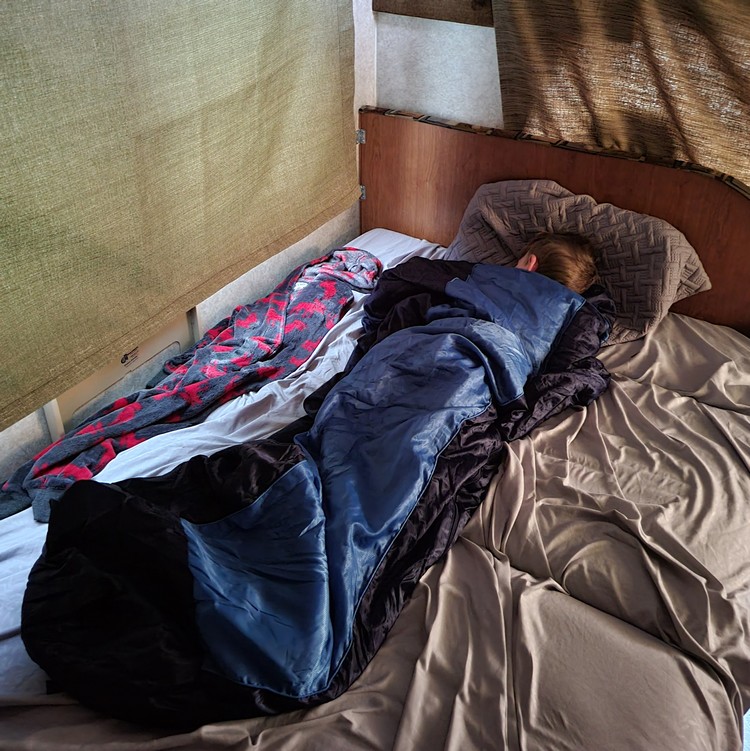
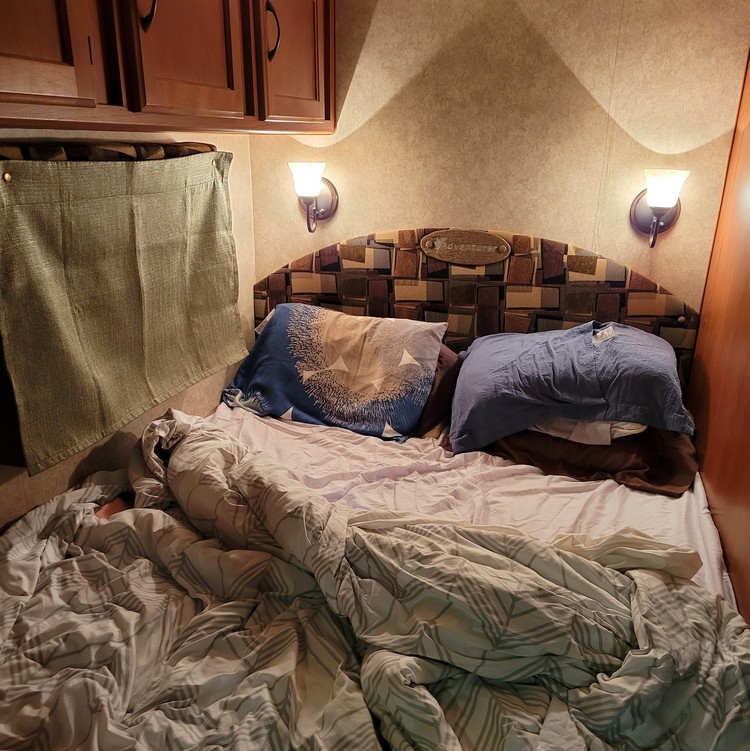


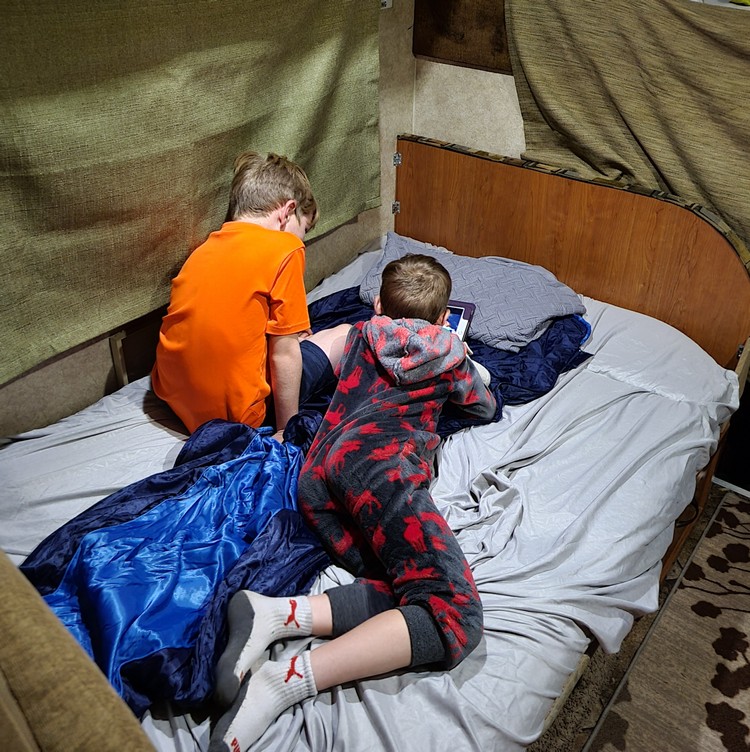
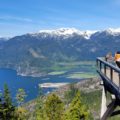

It’s great to know that an RV provided you with all the protection you needed from the elements when you went camping with your RV. My friends and I want to go to an RV resort this coming holidays and I was a bit worried of the bugs and stuff while we’re out in the wild since I’m allergic to a lot of them. It’s good to know that I’m protected from all of those while in an RV and I can just enjoy my time there while I’m with them.
thanks for this! enjoyed reading!